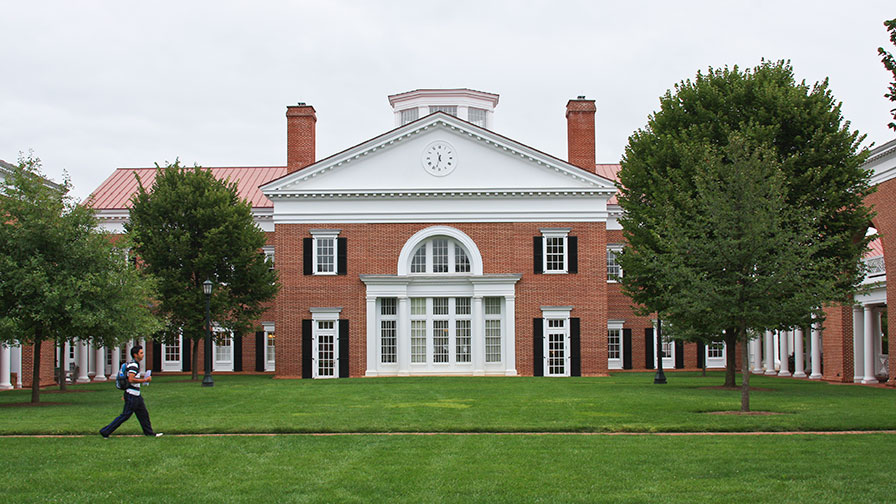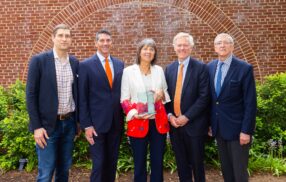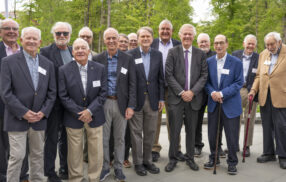
Entrepreneurship in Tibet
The pursuit of new kinds of business opportunities and the observance of a traditional way of life may seem to be inherently at odds. But perhaps entrepreneurs can help preserve, rather than threaten, an ancient culture.
This summer, as part of a longstanding exchange program between UVa and Tibet, 11 members of the UVa and Charlottesville communities got a rare glimpse of both the old and the new in this region.
“Entrepreneurship is not enshrined in the cultural traditions in modern Tibet; it is not socially valorized,” says David Germano, a professor in UVa’s department of religious studies, who organized the two-week visit. “Entrepreneurs on the Tibetan plateau are breaking with tradition in ways that are simultaneously inspiring and problematic. Inspiring because they produce new economic vitality and often innovative solutions to social problems, but problematic because when people start charging for services that have never been conducted in a business context before, they are monetizing complex and highly personal relationships that have existed for generations.”
These new economic and social modes of interaction thus create tensions and force some difficult choices, he notes. “But when Tibetans start businesses in Tibet, they keep money in their communities, and they have intrinsic connections to the place and people,” he says. “If they don’t build these businesses, outsiders will take advantage of the opportunity, often with little concern for the communities’ long-term prospects.”
Germano, whose research focuses on Tibetan Buddhism, is the founding director of UVa’s Tibet Center and of the Tibetan and Himalayan Library, an initiative to use digital technologies to promote the cross-disciplinary study of Tibet. He also helped organize and now serves as the director of UVa’s Contemplative Sciences Center, where he is exploring the application of contemplative practices in multiple fields.
The group that traveled to the region this summer included Batten Institute executive director Sean Carr; Darden professors Andrea Larson and Martin Davidson; Valerie Palamountain, the dean of workforce services at Piedmont Virginia Community College;Wendy Brown, the founder of the Center for Nonprofit Excellence; and others interested in understanding entrepreneurship in this very different context and sharing perspectives and tools with local businesspeople. “We found that business does not necessarily have a positive reputation among Tibetans,” says Carr. “We were exploring ways to reframe that, to help present the potential for business as a force for good in society.”
First-time travelers to Tibet, including Carr, also learned about local culture and practices. “Buddhist iconography is everywhere; the faith is ever present,” he says. “You see public prostrations and circumambulation of temples-what seem like private acts in very public spaces. You can’t separate religious beliefs from the culture or from business. It’s all one.”
In addition to visiting monasteries, museums, and universities in Lhasa, the most famous city in Tibet, and Xining, the capital of China’s Qinghai province, the group met with a wide range of entrepreneurs and owners of enterprises both large and small. These included Dropenling, a business that supports Tibetan artisans; an entrepreneur who has built a business around thangkas, paintings that represent Buddhist deities and other images important in Buddhism; a for-profit school teaching English to Tibetans of all ages; a purveyor of walnut oil, a popular product throughout China; and a business selling homeopathic treatments.
The group also held a daylong workshop on entrepreneurship in Xining, attended by business school students and professors, NGO workers, and local entrepreneurs. During the event, Carr spoke about effectuation, the approach to opportunity development that Darden professor Saras Sarasvathy has documented among expert entrepreneurs, Martin Davidson focused on leadership challenges, and Andrea Larson discussed issues of environmental sustainability. “Access to information is very limited in Tibet,” notes Carr. “There’s no Google and few news outlets, so it’s difficult to learn about new approaches.”
This summer’s trip followed a visit to Charlottesville in fall 2013 by 12 Tibetan entrepreneurs. “The businesspeople from Tibet who traveled here acquired a deeper understanding of some of the challenges of entrepreneurship-the understanding that it involves both new practical skills and new conceptual frameworks,” Germano says. During their stay, the group met with local businesses, worked with the support of PVCC’s Palamountain on small-business skills, studied at UVa’s Batten School of Leadership, and explored entrepreneurial incubation and the principles of effectuation with Ian Ayers (MBA ’09), the founder and CEO of Configment, a consultancy focused on helping ventures in their earliest phases, and the co-founder of the Society for Effectual Action (Ayers subsequently participated in the Tibet trip).
Risk was an important topic for discussion. “These entrepreneurs are not thinking primarily about the risk of losing investors’ money,” Ayers explains. “They are focused on personal risks: the risk of not doing the safe and secure thing of finding a government job, the risk of failure and what that will mean for their reputations.”
“Learning about effectuation seemed to be validating for them,” he notes. “The notion that you can start a business without a lot of money suggested to them they are already operating according to some effectual principles, that what many of them are already doing is okay and they don’t necessarily have to engage in what seems like a more formal process.”
Indeed, as entrepreneurs in Tibet attempt to build new economic relationships within their communities without undermining traditional values, Germano believes adaptive assimilation, in which entrepreneurs learn and modify the business tools and approaches that make sense to them, will be crucial.
Plans are under way for summer 2015, when smaller groups, perhaps including students, will spend time in Tibet focusing on just one business, learning about and helping with its specific challenges. “Our learning experience will be richer if we immerse ourselves in people’s lives and their problems,” Germano says.
In addition to developing a deeper understanding of entrepreneurship in this minority culture, Germano plans to continue focusing the UVa-Tibet exchange on exploring the role local entrepreneurs may play in addressing the region’s economic, political, and cultural challenges and figuring out what education and training can help them succeed.
“There’s a need for sustainable, renewable energy for cultural preservation-in Tibet and elsewhere,” Germano says. “Many efforts spring from an extrinsic investment, like from an NGO, and eventually the money runs out. In Tibet, many NGOs have been shut down, and for those that remain it’s difficult to fund themselves and to scale. We hope entrepreneurship can provide a self-sustaining source of energy that gives Tibetan individuals economic agency while contributing to the vitality of their culture.”
The University of Virginia Darden School of Business prepares responsible global leaders through unparalleled transformational learning experiences. Darden’s graduate degree programs (MBA, MSBA and Ph.D.) and Executive Education & Lifelong Learning programs offered by the Darden School Foundation set the stage for a lifetime of career advancement and impact. Darden’s top-ranked faculty, renowned for teaching excellence, inspires and shapes modern business leadership worldwide through research, thought leadership and business publishing. Darden has Grounds in Charlottesville, Virginia, and the Washington, D.C., area and a global community that includes 18,000 alumni in 90 countries. Darden was established in 1955 at the University of Virginia, a top public university founded by Thomas Jefferson in 1819 in Charlottesville, Virginia.
Press Contact
Molly Mitchell
Associate Director of Content Marketing and Social Media
Darden School of Business
University of Virginia
MitchellM@darden.virginia.edu





